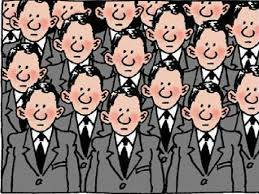
Thirtieth Sunday in Ordinary Time
“Two men went up to the Temple to pray ….” Lk. 18: 10
Comedian Rodney Dangerfield used to tell this joke:
“I went to the doctor the other day and he told me I have a serious health problem.
I said: ‘I want a second opinion.’
The doctor said: ‘OK, You’re ugly too.’”
Comparisons can be brutal.
And yet that’s exactly what Jesus does in today’s gospel. He makes a comparison – one that begins with these words: “Two men went up to the Temple to pray ….”
What is stunning about this comparison is how radical it is.
One of the two does everything right: he fasts twice a week; he gives away a tenth of his income; he follows all the prayer regimens of the Jewish religion of that time. In today’s America, he might be a member of the Knights of Columbus who sends his children to the Catholic school, attends Mass regularly, and is considered to be one of the most highly regarded members of his parish.
What’s not to like about him?
In Jesus’ eyes, one thing: his self-congratulation.
The Pharisee’s prayer embodies a way of being in the world devoid of the very relationships that characterize life in the kingdom of God: love for God and love for neighbor. How can he love God when he is so full of himself? How can he love his neighbors when he sees only their shortcomings?
The Pharisee has missed the forest for the trees. Rather than lifting his heart and mind in truly humble prayer, he indulges in self-glorification: “Thank God, I’m not like other people: thieves, rogues, adulterers.” He stands before God and boasts about his superiority.
Then comes the comparison to the other character in the story: a tax collector. These people squeezed as much money as they could out of the impoverished folks who worked the land. Traitors to their compatriots, tax collectors colluded with the Roman empire for pure profit. Graft, theft and corruption abounded among them. As a consequence, they were hated.
In fact, they were considered so detestable that the Pharisee boasts in his prayer: “God, I thank you that I am not like … this tax collector.” Today, he could just as easily be praying, “I thank you that I’m not like this drug addict. Or this domestic violence perpetrator. Or this welfare offender.”
So, what is it that so disarms God about this tax collector, this enemy of the people?
It’s certainly not his profession. Nor his lifestyle. Nor his choices that have caused so much damage. Jesus doesn’t applaud or approve of any of this.
What Jesus finds so disarming and so honorable is one thing: the tax collector’s humility; his willingness to stand far off, fall to his knees, beat his breast, and throw himself into God’s arms begging for mercy: “God, be merciful to me, a sinner!”
In reading these moving words from today’s gospel, I’m reminded of John Newton, the slave trader, who, upon recognizing the horrifying deeds of his life, fell to his knees and spoke these heart-rending words to God:
“Amazing grace! How sweet the sound that saved a wretch like me.
I once was lost, but now am found, was blind, but now I see.”
I’m reminded also of so many of the addicts that I’ve had the great honor to serve for some 30 years – people who, filled with shame and self-disgust, were able to fall to their knees and admit that on their own they were powerless. The bottom had fallen out in their lives. And now they were finally able to turn their lives over to a “power greater than themselves” – a Power that could lift them up; a Power that could renew them and re-vitalize them and re-orient them; a Power that could bring them to a place of inner peace; a Power that could replace all their guilt and shame with the conviction of being loved and cherished.
But to do that takes great humility. It takes a willingness to admit our own personal sins and failings and hard-heartedness. It takes a commitment to stop our self-congratulations; to stop our readiness to be so judgmental of others; to stop our conviction that we’re in a position to know what really is going on in the hearts and lives of others.
What the gift of humility gives us is the ability to recognize that we too have been blind, and we need to beg for the gift of sight; that we too have been self-congratulatory, and we need to beg for the gift of beating our breasts in recognition of our pride; that we too have been all too eager to stand in front of everyone and seek recognition for our superiority; and that we too, along with the tax collector in today’s Gospel, need to fall to our knees, beat our breasts, and beg: “God, be merciful to me, a sinner!”
Ted Wolgamot, Psy.D.
11809194.1
10/19/16




